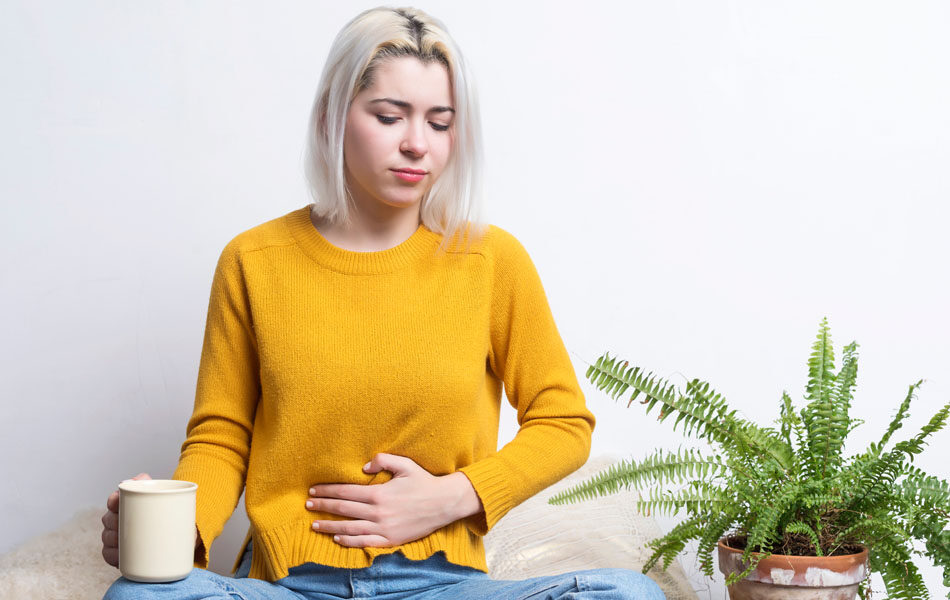Tea for Bloating and Gas: 11 Options to Help Your Gut
Not only is tea a delicious, comforting drink, but it also has many health benefits. One of these is that it aids the digestive tract in relieving bloating. Herbal teas are popular for this reason.

Many things can cause bloating – food intolerances, stomach ulcers, overeating, infections, antibiotic use, and constipation.
Traditional approaches are typically preferred more than over-the-counter medications to avoid further discomfort and possible issues. Common natural remedies include using herbal teas to soothe inflammation and digestive symptoms.
Below, we are going to take a look at the most common herbal tea options to help with digestive issues, bloating, abdominal pain, stomach pain, and irritable bowel syndrome to relieve bloating. So let’s get right to it.
Tea for Bloating: Does It Work?
Fortunately, the answer is yes. Herbal teas do work to soothe abdominal pain, bloating, irritable bowel syndrome (IBS), and mild digestive issues. This is because tea has anti-inflammatory properties that promote healthy digestion while relieving digestive discomfort.
Remember that tea cannot replace medical treatment for more severe digestive issues and chronic conditions within the digestive system. However, drinking your favorite herbal teas can take the edge off bloating and reduce the symptoms enough to make it manageable. The best thing is that you can also drink unsweetened tea while fasting, as it does not impact your blood sugar levels.
What Kind of Tea Helps With Bloating? 11 Options to Try Today
Herbal teas are one of the best natural remedies to reduce bloating, period bloating and even constipation. Here are the best 11 options to try.
#1 Peppermint tea
Peppermint is regarded as a traditional remedy for various ailments, especially those involving the digestive tract. It has a refreshing, cool flavor that is as tasteful hot as it is cold.
Studies conducted on animals have suggested that the flavonoids in peppermint can inhibit mast cell activity. These cells are found in the gut and are often responsible for bloating. Additionally, peppermint relieves intestinal spasms and relaxes the gut muscles.
Peppermint oil has been shown to support digestion and alleviate bloating, stomach pain, and gas. While peppermint tea hasn’t been tested specifically for bloating, the results in tests with the digestive process have been positive.
#2 Ginger tea
If you are feeling bloated, ginger tea may be just the thing for you. It has a refreshing flavor and is made from the roots of the ginger plant. Some people find the spicy flavor to be overwhelming, but you can use lemon or honey to soften it. Ginger has been used for centuries to cure stomach ailments.
Ginger capsules can relieve intestinal bloating, gas, and cramping while soothing digestive upset and speeding up stomach emptying. Most studies conducted have been done using ginger capsules or extracts rather than tea, but the benefits of ginger can’t be denied.
#3 Dandelion root
If you often experience bloating in your intestinal tract, this is the best tea for you. For decades, people have opted for natural remedies like dandelion flowers to act as a diuretic.
Research has shown that those who consumed 8oz of dandelion extract daily urinated more often in greater amounts. When participants stopped taking the extract, their urination returned to pre-study levels.
If you suffer from water retention-related bloating, give the delicious roasted flavors of this tea a try.
#4 Fennel tea
Fennel tea may not be your cup of tea (pun intended) if you aren’t a fan of licorice flavor. But fennel has been used for digestive issues such as bloating, gas, constipation, and abdominal pain for centuries.
The main source of feeling bloated is constipation, so jump-starting bowel movements can resolve bloating. This is where fennel shines. Studies showed that those who drank fennel tea daily for 28 days had 1 more bowel movement per week than those who didn’t.
Additionally, you can add fennel seeds to your morning cereal or smoothie.
#5 Chamomile tea
Not only is chamomile tea delicious, but it is also one of the most commonly used herbal teas in the world to treat gas, nausea, indigestion, bloating, vomiting, and ulcers.
Studies have suggested that chamomile tea can prevent the bacteria that cause bloating and stomach ulcers.
The flowers of the chamomile plant have many beneficial components, such as flavonoids, but you need to ensure the tea is made using the flower heads, not the stems and leaves.
#6 Hibiscus
Fragrant hibiscus flowers aren’t just beautiful. Hibiscus tea can balance aldosterone, the hormone that ensures your kidneys process salt and water properly and keep your electrolytes balanced.
If your bloating is caused by water retention, this fragrant tea is definitely for you. Better yet, hibiscus has antioxidants and vitamin C, which support digestion. It also inhibits E. coli, one of the bacteria responsible for gas and bloating.
#7 Green tea
Green tea is well-known for its health benefits, which have been linked to weight loss, reduced risk of heart disease, diabetes management, and constipation relief.
Aside from the above health benefits, those who drink green tea may experience positive results for their gastrointestinal system, relieving gas, bloating, ulcers, and pain. While more research needs to be done, it’s safe to say there are great upsides to this option.
Green tea is also frequently used to make kombucha, which can also help to beat the bloat.
#8 Matcha
Matcha has recently gained popularity for its anti-inflammatory and antioxidant effects. It has a deep green color and an earthy flavor and boasts health benefits, including cancer-fighting properties and weight loss due to increased metabolism.
It is also great for gastrointestinal health – reducing gas and increasing food absorption. If you are feeling bloated, you can enjoy a cup of matcha – just remember not to add any refined sugars and opt for a natural sweetener instead.
#9 Lemon balm
This tea has a soothing, fresh lemon flavor and scent with a slight hint of mint, as this plant is from the mint family. Studies showed that lemon balm could be used to relieve mild digestive problems, which include bloating.
In fact, Iberogast, a common indigestion medication used worldwide, uses lemon balm as the main ingredient. Using lemon balm can decrease constipation, GI tract issues, abdominal pain, irritable bowel syndrome, and nausea.
#10 Gentian root
This bitter tea has often been used to get the digestive juices flowing and to break down food to relieve abdominal bloating. Many who drink gentian root prefer to mix it with honey or chamomile tea.
Gentian root has long been used in medicinal products for gastric disorders. Although the tea hasn’t been studied for use with digestion disorders, it is not advised if you have stomach ulcers, as gentian root can increase acidity in the stomach.
#11 Turmeric tea
Turmeric is well-known for its anti-inflammatory effects. Turmeric root is used as such in traditional Chinese medicine. This yellow spice has a bitter flavor and is also great for reducing inflammation in the GI tract, soothing digestive disorders, and reducing bloating and abdominal pain.
Patients with IBS took turmeric supplements for 8 weeks and saw a marked improvement in their symptoms, including a significant decrease in gas and discomfort. The curcumin found in turmeric stimulates the stomach to break down food, aiding in digestion.
A Word From Our Nutritionist
When some foods aren’t properly digested, they begin fermenting in the gut. This produces gas that leads to bloating. Other reasons include ulcers, colon inflammation, food allergies, or carbonated beverages, all of which can trigger bloating.
Herbal teas are a great option to reduce the amount of bloating experienced, giving you a safe, effective, at-home remedy to eliminate stomach cramps, tightness, and discomfort and treat indigestion.
The best teas are the ones that you enjoy drinking and that have an impact on your system. Of the 11 teas we have suggested, try as many as possible to see which has the best anti-bloating effects for your body.
Conclusion
Traditional Chinese medicine has been practiced as one of the most popular herbal remedies for hundreds of years, focusing on herbal teas to decrease bloating, intestinal cramping, stomach acidity, and manage weight.
Green tea, ginger tea, and lemon balm are the most popular options to reduce bloating. However, all of the above options are great for the digestive system, so the choice is yours.

















































 Select your language:
Select your language: 








